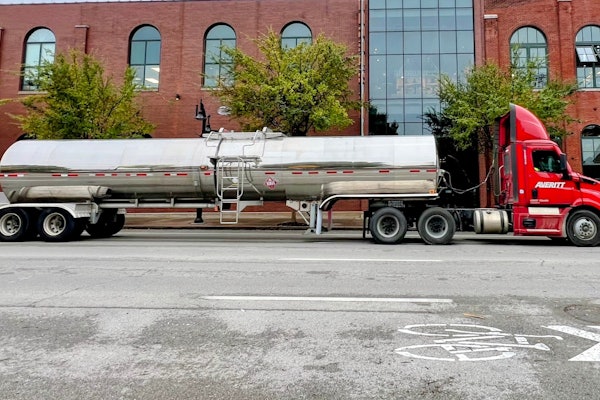Bradley Harper, a mid-level manager at an Alabama-based carrier, is earning an executive MBA on the weekends.
The journey to trucking for Debra Stone, a logistics analyst for a private fleet, was different than many of her peers. Fresh out of Vanderbilt University with a degree in chemistry, Stone joined McKee Foods in 1982 to work in its laboratories testing ingredients the company’s Little Debbie snack food products. She figures she was about as far away from trucking as you can get.
“I’ve worked for McKee for 20 years,” Stone says. “Most people change careers three times in their lives. I did that, but I just stayed at the same company.” She was asked initially to move to purchasing and then made the leap to McKee Foods’ 300-truck transportation division when a more lucrative position came open. “I was kind of bored in purchasing and there wasn’t an opportunity to advance. I figured how hard can this transportation thing be? I mean the product goes on a truck and the truck goes out, right?”
Stone learned quickly the job was more complicated than that. Five years later, she’s still learning but at least has the certification to prove that she has learned a lot. Stone completed a National Private Truck Council education program and is now a Certified Transportation Professional.
Such programs are now common in an industry that traditionally has trained its workers and managers on the job. Trucking company managers generally come up from the ranks, gaining their education not from an academic program but from the driver’s seat or dispatcher’s chair.
But as the industry has become more complex in technology and business structure, it has more options for fleet education. A fleet manager can now receive a masters of logistics or transportation from dozens of colleges. Masters degrees in business are now more common and often desired of mid- and upper-level managers at large fleets. And certification programs, like the one Debra Stone took part in, are adding distinction to resumes and money to the bottom line of savvy carriers.
Opening doors
Although a manager who completes an educational program may be more competitive in the job market, many trucking operations support a manager’s schooling because it improves his performance and, therefore, the performance of the company. That’s the principal reason why Bradley Harper’s boss encouraged him to enroll in the University of Alabama’s executive MBA program, even though Harper already had an undergraduate degree in transportation from Auburn University.
Harper, director of interaction, technology, pricing and contracts for flatbed carrier WTI, a division of Boyd Bros., is halfway through the 18-month program, which meets for classroom instruction every other weekend and several weeks a semester. The education is already paying off, Harper says. “Bits and pieces of the coursework are coming up in my job. My accounting classes help me a lot, especially understanding financial statements. I’ve even been able to use simple statistics from my statistics classes to track productivity.”
But the financial education is only the beginning. Because the program is designed for business managers with at least five years of business experience, Harper has been able to apply examples from other industries directly to trucking.
“The program includes attorneys, engineers and many other professionals,” Harper says. “When you get into a particular career path, your knowledge is limited to that industry. It helps being around other people in other fields to broaden my horizon. It’s interesting to see how other businesses operate.”
In transportation-specific programs, participants often network with employees of other trucking companies, vendors or potential customers. Georgia Tech’s executive masters program in international logistics, for example, takes students to the hotbeds of intermodal trade around the world. Students visit companies like BMW that ship goods around the globe, see operations at the port of Rotterdam, and troubleshoot major supply chain problems in the classroom in a business practical setting. The program lasts 18 months, but students stay on the job, taking five two-week study residences in Atlanta, Asia, Europe and Latin America. Among the program’s graduates are executives from Schneider and Ryder.
The Georgia Tech program exposes managers to the whole supply chain. The principal benefits are twofold, says Managing Director Terri Herod. “Students get to network in class with other transportation professionals and get to network in the countries where they might do business.”
For Steve Kowalkoski, vice president of automotive operations at Schneider Logistics, networking alone was worth the investment in the Georgia Tech program. “The networking opportunities were tremendous,” he says. “My classmates were from every industry and from many parts of the world including China, the Middle East and South America. I’ve used those contacts. As Schneider looks to expand internationally, we’re able to look to these people for help.”
Kowalkoski’s education is a part of a corporate policy at parent-company Schneider National, where employees who take part in business-related programs are reimbursed for their education expenses. “We have a goal of growing internationally. How do you find the talent to do that? You can go out and hire it. Or you can educate your own employees.”
Certifiable?
While masters degrees have now become more common in the trucking industry, certification for private fleet managers, safety directors and technicians have been around for years. All the programs have been designed to codify the knowledge a supervisor in a trucking company should know. Here are a few organizations and what they certify.
North American Transportation Management Institute (www.natmi.org), or NATMI, has been offering certifications to fleet professionals for nearly 50 years. In fact, it was founded because insurance companies, the American Trucking Associations and other groups felt there was no formal training available for fleet supervisors, says Jeffrey Arnold, NATMI’s executive director.
The organization offers certification for directors of maintenance and equipment, safety supervisors and driver trainers. Courses are available in safety management, maintenance management, accident investigation, driver training and regulatory compliance. Arnold says NATMI’s safety program in particular is designed to qualify safety managers and give them the analytical skills to improve accident rates. Like other safety programs, NATMI teaches regulatory compliance, but Arnold says the training goes more toward improving safety than meeting the minimum legal requirements.
“We focus a lot of our training on case-based scenarios,” Arnold says. “At a safety director level, they analyze data much as they would on the job. They learn how to track accident trends and come up with a conclusion. We coach them through the process on how to evaluate accident trends and report them to a group.”
The courses are designed for the busy schedule of carrier staffs, and the certification that results can help carriers lower their insurance premiums, Arnold says. The certification alone won’t result in lower premiums, but graduates tell Arnold, that lessons they learn and apply lowers the overall accident experience, resulting in better rates. Instruction is on site, although much of the reading can be done ahead of time.
Transportation Intermediaries Association (www.tianet.org) began its Third Party Logistics University to ensure a standard of excellence behind certain industry practices, says Bob Voltmann, executive director and CEO. “The brokerage business grew up in the ’80s with no cookbook,” he says. “This is a sign that the industry has matured.”
While logistics programs in college only touch on brokering, TIA has developed a curriculum for transportation employees focusing on brokering. Brokers achieve TIA’s Certified Transportation Broker level after they complete an Internet-based home-study course and pass TIA’s CTB exam.
Other classes, including ones on hazmat, climate-control brokering, sales and legal issues, are also available. More than 700 brokers have passed the test, many from 3PLs. Voltmann says the courses are ideal for fleets that have a brokerage but may not have any formal training. “A lot of the problems in the industry come from trucking companies that have created brokerages but really don’t understand how to do it,” Voltmann says. “There are lots of regulations out there that people don’t realize. A carrier that’s a broker has to have two separate motor carrier numbers; they have to have separate books; and if they accept a load, they can’t just rebroker it.”
The certification program at the National Private Truck Council (www.nptc.org) was built on the recognition that private carriers often have equipment or personnel managers who may come
Technicians must pass a rigorous test to achieve ASE certification.
from manufacturing or some other area within the company. President and CEO Gary Petty says another reason also played a big role.
“Increasingly, we were finding that the traditional skill profile of the fleet manager was rapidly changing,” Petty says. “Where he was once knowledgeable about drivers and equipment – he knew trucks and drivers and how to keep both of them in working order – the job has become more sophisticated.”
In particular, the business model has changed for many private carriers. Fleet managers need to know finances and must possess many of the same skills their for-hire counterparts have. “We’ve moved from purely a private fleet to more of a blended operation,” Petty says. “We have to do all those things like maintenance, drivers and dispatch, and in addition, deal with dedicated fleets, 3PLs, leasing and outsourcing of maintenance.”
NPTC’s Certified Transportation Professional certification requires five years of experience for completion. Students attend a one-week institute, study at home and eventually take a test offered in February. The home study course includes a 600-page manual that covers the entire subject matter of the exam.
NPTC also recently launched its Fleet Learning Center, an Internet-based educational program that includes five core transportation courses. Petty hopes the center will become a stepping stone to full certification for participants.
For shop managers, the blue seal of an Automotive Service Excellence (www.ase.com) certification means a technician has the basic skills needed to fix a truck’s brakes, steering or transmission. Such certifications have been around for 25 years and are as common in mom-and-pop shops as they are at Fortune 500 companies, says Tony Molla, vice president of communications for ASE.
“The certification is the minimum body of knowledge a technician needs to have to work on brakes or whatever their certification is in,” Molla says. “A master technician certification means a mechanic has a wide body of knowledge as opposed to a brake specialist.”
Technicians need at least two years on the job (or two years of education and a year on the job) before they can qualify for ASE tests.
Shops typically reward mechanics that pass the tests, and fleets and dealers often advertise the ASE Blue Seal of Excellence to identify themselves as a quality shop. For shops that do outside work, it’s a marketing distinction. For others, investment in certification can help prevent breakdowns and reduce maintenance costs. Mechanics with the certification may cost a company more to hire, but “ASE technicians tend to fix the vehicles right the first time,” Molla says.
Having an ASE-certified staff may also mitigate legal claims resulting from an equipment failure. “While being ASE won’t protect you in a worst case scenario, not being ASE will expose you to greater risk,” Molla says.
Basic training
Masters programs and advanced certification programs are at the higher end of educational opportunities, but there are options available to people just entering the business.
California State University – Long Beach developed a track for entry-level intermodal workers six years ago, says Executive Director Marianne Venieris. The university’s extension system offers certification programs for non-degreed workers in global logistics and hazardous material.
“Since the first class in January 1997, we’ve had close to 700 students go through the program,” Venieris says. “More than half earned professional designation.”
Entry-level logisticians now receive training in industry jargon, software, customer service, regulations, documents – even how to write e-mails – where in the past all of their training was “on the job,” Venieris says. “On the first day of the job for most of these guys, the boss gave them a phone book and said start calling. That was their training. People don’t have time to train people new to the job. And the skills required are much more sophisticated.”
Carriers realize they can save money by better managing the supply chain and by focusing on positions further down the ladder. “They’re willing to pay more for those employees,” Venieris says. “A degree looks rather good, particularly with someone who has a degree in an area that fits.”
Cal-State added a masters of global logistics for those professionals seeking to go further. Carriers are pushing their mid-level managers to keep up with education because the programs are keeping up with transportation trends.
That knowledge is increasingly vital in companies, large and small, that are trying to keep up with trends in the U.S. market. With shipping between Mexico and Canada on the rise as well as growth in intermodal hauling, even the smallest of carriers play a roll in the global supply chain.
Fleets also are seeing that academic programs are taking real-world approaches. “When we developed our program, we were told it had to be taught at night and that companies didn’t want faculty to teach it,” Venieris says. “The industry didn’t believe that the ivory tower had any knowledge of the industry.”
But the research done by academic programs in cooperation with trucking companies and global logistics providers have helped fleets reduce costs and improve efficiency. Business programs routinely partner with companies to improve business models, teach leadership and analyze managerial and supply chain structures.
Where once a fleet manager might have asked what a professor knew about trucking, some savvy carriers are learning that the partnership between higher education and transportation is indispensable.
“That’s exactly what executives are realizing,” says Lisa Williams, a logistics professor at the University of Arkansas. “They don’t know how to maximize the business opportunities that they have. They are looking for the leadership experience and assessment tools they can take to the next level.”
Higher learning in off hours
The growing complexity of transportation means that even experienced managers who came up through the ranks as drivers or dispatchers often need or want formal education. In many cases, however, significant time out of the office may be undesirable or impossible. Fortunately, Web-based education, weekend executive classes and two-week certification programs have made it much easier to obtain an advanced education without losing time at the office.
The National Private Truck Council has just launched an online learning center where students can study for certification and take up to five core courses, says President and CEO Gary Petty. “They’re available online as a free-standing learning experience,” he says. “There may be managers interested in just taking the classes or there may be those who use them as stepping stones to the full certification experience.”
Distance-learning programs like that offered by NPTC are more common for certification programs and for degree program, but a few universities have put their entire MBA programs online. Three years ago, Cardean University launched an MBA program that students take wholly over the Internet. The school is no fly-by-the-night educational experience, with professors and input from renowned universities like Columbia, Stanford, Chicago, Carnegie Mellon and the London School of Economics and Political Science. Students can earn a degree in as little as 22 months, taking six-week and nine-week courses year round.
While Cadean and other universities deliver higher education over the computer, more managers are improving their knowledge through popular executive programs. Such programs generally last for 18 to 24 months, but are taught on weekends and weeknights to accommodate work schedules. Georgia Tech’s masters of international logistics is one such program, and other universities from California to Arkansas to Pennsylvania offer similar degrees.
Executives from ABF, J.B. Hunt, FedEx and American Freightways have taken part in the University of Arkansas’ executive masters courses, says Lisa Williams, a professor and holder of the Oren Harris Chair in Logistics. The programs combine Web- and video-based distance-learning instruction as well as flexible locations. The courses are taught at night so mangers can continue to work while studying.
“Our masters program is geared toward those who are working,” Williams says. “It’s so flexible for them.”









